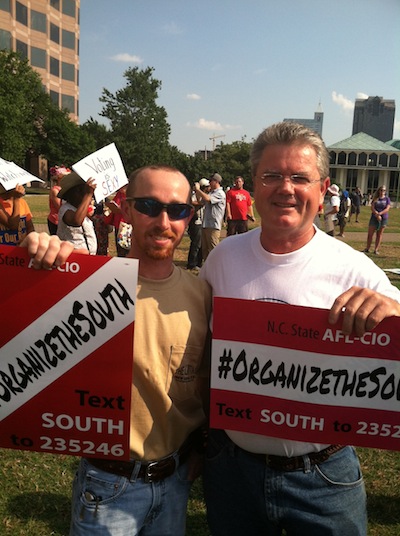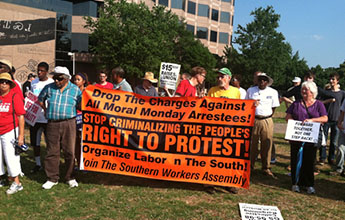
North Carolina Protests
|
 |
Local 289 member David Haynes, right, at Moral Mondays protesting. |
The “Moral Mondays” protests are about multiple issues, ranging from voters’ rights to education. What brings the movement together is working people, says David Haynes, the IBEW Membership Development Department’s lead organizer in North Carolina.
Moral Mondays advocates say the protests affect all Americans, because what is happening in North Carolina could become a model for anti-worker politicians across the country.
“It’s important. I know a lot of folks see stuff going on in other states and sometimes they fail to connect how it affects them directly,” Haynes said.
A bill signed by Gov. Pat McCrory last year cut maximum weekly unemployment benefits from $535 to $350 and reduced the number of weeks the jobless could collect from 20 to 12. Workers find it frustrating what the legislature did to the unemployment system, said Haynes. “They went in and they pretty much dismantled our unemployment insurance system. We had one of the better ones in the country.”
The legislature has also targeted teachers. In July 2013, lawmakers passed a state budget that eliminated teacher tenure and froze their salaries. The bill also put thousands of teaching assistants out of work.
The governor offered to raise the wages of the lowest paid teachers in the state, but in order to get the raises they had to sign away their rights to tenure.
The legislature’s anti-worker bent isn’t just limited to teachers. Last year, House Speaker Thom Tillis (now U.S. Senate candidate) sponsored a bill that would place a referendum on the ballot enshrining the state’s so-called right-to-work law in the constitution.
 |
| Activists at Moral Mondays protest for workers’ rights in Raleigh, N.C. |
IBEW members are showing their support by attending Moral Monday events. “Like all other unions, we’re talking to our friends and neighbors, and encouraging other folks to turn out as well,” Haynes said.
The number of attendees varies each week, but there always seems to be a good showing of people, Haynes said. He estimates about 5,000 people attended the June 9 protest. Moral Mondays can get twice as big though. Last year, there were 10,000 people at one event.
North Carolina is considered a relatively moderate southern state, Haynes said, voting for Barack Obama in 2008.
“For us to go from being a purple state in 2008 to literally a fundamentalist, conservative red state over a period of literally two years is just unthinkable, but that’s the effect of money in politics,” Haynes said. “They’ve pretty much been able to buy elections at least until people wise up and start voting different.”
Art Pope, retail mogul and ultraconservative ideologue, has spent an unprecedented amount of money in North Carolina politics. Pope’s political committees spent a record breaking $2.2 million on state legislative races in 2010 alone. In 2012, he kicked in an additional $2 million to elect McCrory and guarantee the GOP a supermajority in the General Assembly.
To learn more about Moral Mondays, click here.
![]()